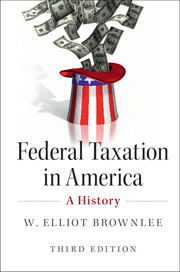Book contents
- Frontmatter
- Dedication
- Contents
- Figures
- Preface
- Acknowledgments
- 1 Anglo-American Regimes
- 2 Creating a Modern Fiscal State
- 3 The Civil War Regime
- 4 The World War I Regime
- 5 Roosevelt's Regimes
- 6 The Era of Easy Finance
- 7 “Reagan Revolution”
- 8 Fiscal Consolidation and Revival of the Old Tax Regime
- 9 Victory for a Retro-Liberal Regime
- 10 Fiscal Paralysis
- Appendix
- Historiography and Bibliography
- Index
Historiography and Bibliography
Published online by Cambridge University Press: 05 July 2016
- Frontmatter
- Dedication
- Contents
- Figures
- Preface
- Acknowledgments
- 1 Anglo-American Regimes
- 2 Creating a Modern Fiscal State
- 3 The Civil War Regime
- 4 The World War I Regime
- 5 Roosevelt's Regimes
- 6 The Era of Easy Finance
- 7 “Reagan Revolution”
- 8 Fiscal Consolidation and Revival of the Old Tax Regime
- 9 Victory for a Retro-Liberal Regime
- 10 Fiscal Paralysis
- Appendix
- Historiography and Bibliography
- Index
Summary
Toward the end of World War I, the Austrian sociologist Rudolf Goldscheid proposed a “fiscal sociology” as a new way to study the public budget. He wanted to analyze the budget as “the skeleton of the state stripped of all misleading ideologies.” Goldscheid explained that “nowhere [is] the entirety of any given order of society and economy…reflected as clearly [as] in the public household, that the State cannot be very different from its financial system, [and] that every single private household is intimately connected with the State household.” Another Austrian scholar, the economist Joseph Schumpeter, seconded Goldscheid's proposal and stressed that the fiscal sociology should have a historical basis. In 1918, Schumpeter declared:
The spirit of a people, its cultural level, its social structure, the deeds its policy may prepare – all this and more is written in its fiscal history, stripped of all phrases. He who knows how to listen to its message here discerns the thunder of world history more clearly than anywhere else.
The severe wartime fiscal crisis and attendant debates over the meaning of the modern state within the ruins of the Austro-Hungarian Empire stimulated Goldscheid and Schumpeter to develop their interest in fiscal sociology, fiscal history, and the history of taxation.
In a similar fashion, in the United States severe fiscal crises, or perceptions of them, have stimulated bursts of scholarly interest in the history of taxation and its fiscal policy context. One such burst accompanied the fiscal tensions and conflicts that accompanied the economic downturns – that is to say, the severe recessions or depressions – that began during the 1870s and continued through the 1930s, as well as the two world wars of the twentieth century. A second burst began a generation later, during the 1970s, and continues today. It has been associated with two interrelated processes: the economic erosion of the “era of easy finance” that emerged from the New Deal and the sustained political attack on the fiscal institutions created during the national crises of the twentieth century. Both bursts sought to study tax history in order to understand contemporary policy options and to enrich knowledge of American society and government.
- Type
- Chapter
- Information
- Federal Taxation in AmericaA History, pp. 295 - 320Publisher: Cambridge University PressPrint publication year: 2016



